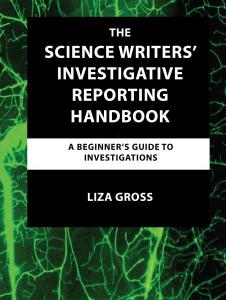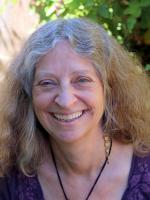Liza Gross: Investigative Reporting
For this column, NASW book editor Lynne Lamberg asks NASW authors to tell how they came up with the idea for their book, developed a proposal, found an agent and publisher, funded and conducted research, and put the book together. She also asks what they wish they had known before they began working on their book, what they might do differently the next time, and what tips they can offer aspiring authors. She then edits the A part of that Q&A to produce the author reports you see here.
Publication of NASW members’ reports in Advance Copy does not constitute NASW’s endorsement of their books. NASW welcomes your comments, and hopes this column stimulates productive discussions.
THE SCIENCE WRITERS’ INVESTIGATIVE REPORTING HANDBOOK:
A BEGINNER’S GUIDE TO INVESTIGATIONS
Liza Gross
Watchdog Press, June 9, 2018, $9.99
ISBN-10: 1732333904; ISBN-13: 978-1732333901
ASIN: B07DMTKL4G
Gross reports:
When I started writing about science, nearly 20 years ago, I focused on how powerful interests exploit science in pursuing profits at the expense of environmental and public health. I didn’t realize then that science journalists had long been knocked for preferring hagiography to exposé. Once attuned to the “science writer as stenographer” trope, I seemed to hear it everywhere.
I certainly believe science should be scrutinized like any other subject–which is why I wrote this book. I think the reasons science writers don’t do more investigations are complicated. Investigations are hard. They’re time consuming, costly and often tedious. I knew that many of my colleagues would try investigative reporting if they knew how to start. I wrote this guide to help them do just that.
Toward that end, I applied for and won an NASW Peggy Girshman Idea Grant. I didn’t seek an agent and publisher, but decided to self-publish. The grant covered much of the time I spent researching and writing the book, and the costs of self-publishing were minimal.Producing the book, however, turned out to be more challenging than I’d expected. I had to learn enough Illustrator to design my cover, which involved a steep learning curve. Though I found a Word template designed for self-publishers, Word is notoriously ill-equipped for design. Changes in one section had a maddening habit of generating errors elsewhere. If I self-publish again, I’ll take the time to learn a professional design software like InDesign.
Having total control over the book, from conception to production, was a rich learning experience. I wish I’d given more thought to finding an agent and publisher so I could have spent more time writing. Like any first-time author, I found the prospect of writing that first chapter daunting and had a hard time getting started. I wish I’d followed the advice of sage writing coaches: go for walks, clean the house, take naps. Then sit down and put words, any words, on the page. It’s amazing how sentences start to flow once you stop staring at a blank screen.
Contact info:
- Liza Gross, 510-525-2494, lizagross@gmail.com, www.lizagross.com, @lizabio
- Book website: https://www.lizagross.com/investigative-science-reporting/
- Blog: https://www.lizagross.com/blog/
Buy this book now in the ScienceWriters bookstore. Your purchase helps support NASW programs and services.
NASW members: will your book be published soon? Take advantage of this opportunity for shameless self-promotion. Submit your report for Advance Copy.
Tell your fellow NASW members how you came up with the idea for your book, developed a proposal, found an agent and publisher, funded and conducted research, and put the book together. Include what you wish you had known before you began working on your book, or had done differently.
See https://www.nasw.org/advance-copy-submission-guidelines.
Thinking of writing a book? If you are a NASW member, you may access a list of more than 150 books and online resources to help you craft your book proposal, find an agent and funding sources, negotiate your contract, learn about self-publishing, publicize and market your book, and more at https://www.nasw.org/article/write-book.
Send book info and questions about book publishing to Lynne Lamberg, NASW book editor, llamberg@nasw.org.


